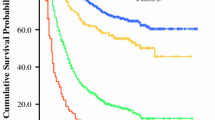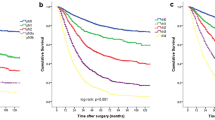Abstract
Background
The purpose of this study was to evaluate the impact of the negative lymph node (NLN) count on the prognostic prediction of the ratio between positive and examined lymph nodes (RML) in gastric cancer after curative resection.
Methods
The positive and negative node counts were determined for 456 patients who underwent curative resection for gastric cancer. Overall survival was examined according to clinicopathologic variables. The correlation between the NLN count and the aforementioned best variable for prediction the disease-specific overall survival was examined.
Results
The NLN count cutoffs were designed as 0–9, 10–14, and ≥15, with the 5-year survival rate 4.1, 30.7, and 74.8%, respectively. RML of 98 patients who had an NLN count of nine or fewer was ≥40%. The median survival of these patients was 12 months. Of 88 patients who had 10 to 14 NLN count, 7 had 74-month median survival with 0.1–10% RML, 52 had 47-month median survival with 10.1–40% RML, and 29 had 22-month median survival with >40% RML. Of 270 patients who had ≥15 NLN count, 157 had 114-month median survival without positive nodes, 62 had 98-month median survival with 0.1–10% RML, 45 had 40-month median survival with 10.1–40% RML, and 6 had 14-month median survival with >40% RML.
Conclusions
The NLN count is a key factor for improvement of survival prediction of RML in gastric cancer.







Similar content being viewed by others
References
Manfe AZ, Segalina P, Maffei Faccioli A. Prognostic factors in gastric cancer. Our experience and review of the literature. Minerva Chir 2000;55:299–305.
Yokota T, Kunii Y, Teshima S, et al. Significant prognostic factors in patients with early gastric cancer. Int Surg 2000;85:286–90.
Ding YB, Chen GY, Xia JG, et al. Association of VCAM-1 Overexpression with oncogenesis, tumor angiogenesis and metastasis of gastric carcinoma. World J Gastroenterol 2003;9:1409–14.
Abe N, Watanabe T, Suzuki K, et al. Risk factors predictive of lymph node metastasis in depressed early gastric cancer. Am J Surg 2002;183:168–72.
Yamaguchi T, Sano T, Katai H, Sasako M, Maruyama K. Node positive mucosal gastric cancer: a follow-up study. Jpn J Clin Oncol 2001;31:153–6.
Chen CY, Wu CW, Lo SS, et al. Peritoneal carcinomatosis and lymph node metastasis are prognostic indicators in patients with Borrmann type IV gastric carcinoma. Hepatogastroenterology 2002;49:874–7.
Pan W, Ishii H, Ebihara Y, Gobe G. Prognostic use of growth characteristics of early gastric cancer and expression patterns of apoptotic, cell proliferation, and cell adhesion proteins. J Surg Oncol 2003;82:104–10.
Coburn NG, Swallow CJ, Kiss A, Law C. Significant regional variation in adequacy of lymph node assessment and survival in gastric cancer. Cancer 2006;107:2143–51.
Deng JY, Liang H, Sun D, Zhan HJ, Wang XN. The appropriate cutoffs of positive lymph nodes to evaluate the prognosis of gastric cancer patients. J Surg Oncol 2008;98:343–8.
Wu CW, Hsieh MC, Lo SS, et al. Comparison of the UICC/AJCC 1992 and 1997 pN categories for gastric cancer patients after surgery. Hepatogastroenterology 2001;48:279–84.
Katai H, Yoshimura K, Maruyama K, Sasako M, Sano T. Evaluation of the new international union against cancer TNM staging for gastric carcinoma. Cancer 2000;88:1796–800.
Okusa T, Nakane Y, Boku T, et al. Quantitative analysis of nodal involvement with respect to survival rate after curative gastrectomy for carcinoma. Surg Gynecol Obstet 1990;170:488–94.
Shiu MH, Perrotti M, Brennan MF. Adenocarcinoma of the stomach: a multivariate analysis of clinical, pathologic and treatment factors. Hepatogastroenterology 1989;36:7–12.
Jaehne J, Meyer HJ, Maschek H, et al. Lymphadenectomy in gastric adenocarcinoma: a prospective and prognostic study. Arch Surg 1992;127:290–4.
Adachi Y, Kamakura T, Mori M, et al. Prognostic significance of the number of positive lymph nodes in gastric carcinoma. Br J Surg 1994;81:414–6.
Sobin LH, Wittekind CH. International Union Against Cancer (UICC). TNM classification of malignant tumors. 5th ed. New York: Wiley; 1997.
Hayashi H, Ochiai T, Suzuki T, et al. Superiority of a new UICC-TNM staging system for gastric carcinoma. Surgery 2000;127:129–35.
Omejc M, Juvan R, Jelenc F, Repse S. Lymph node metastases in gastric cancer: correlation between new and old UICC TNM classification. Int Surg 2001;86:14–9.
Inoue K, Nakane Y, Iiyama H, et al. The superiority of ratio-based lymph node staging in gastric carcinoma. Ann Surg Oncol 2002;9:27–34.
Hyung WJ, Noh SH, Yoo CH, et al. Prognostic significance of metastatic lymph node ratio in T3 gastric cancer. World J Surg 2002;26:323–9.
Nitti D, Marchet A, Olivieri M, et al. Ratio between metastatic and examined lymph nodes is an independent prognostic factor after D2 resection for gastric cancer: analysis of a large European monoinstitutional experience. Ann Surg Oncol 2003;10:1077–85.
Marchet A, Mocellin S, Ambrosi A, et al. Italian Research Group for Gastric Cancer (IRGGC). The ratio between metastatic and examined lymph nodes (N ratio) is an independent prognostic factor in gastric cancer regardless of the type of lymphadenectomy: results from an Italian multicentric study in 1853 patients. Ann Surg 2007;245:543–52.
Japanese Gastric Cancer Association. Japanese classification of gastric carcinoma. 2nd English edition. Gastric Cancer 1998;1:10–24.
Smith DD, Schwarz RR, Schwartz RE. Impact of total lymph node count on staging and survival after gastrectomy for gastric cancer: data from a large US-population database. J Clin Oncol 2005;23:7114–24.
Msika S, Benhamiche AM, Jouve JL, Rat P, Faivre J. Prognostic factors after curative resection of gastric cancer: a population-based study. Eur J Cancer 2000;36:390–6.
Dicken BJ, Bigam DL, Cass C, et al. Gastric adenocarcinoma: review and considerations for future directions. Ann Surg 2005;241:27–39.
Okajima K. Prognostic factors of gastric cancer patients-a study by univariate and multivariate analysis. Jpn J Gastroenterol Surg 1997;30:700–11.
Aiko T, Sasako M. The new Japanese Classification of Gastric Carcinoma: points to be revised. Gastric Cancer 1998;1:25–30.
Bando E, Yonemura Y, Taniguchi K, et al. Outcome of ratio of lymph node metastasis in gastric carcinoma. Ann Surg Oncol 2002;9:775–84.
Baxter NN, Tuttle TM. Inadequacy of lymph node staging in gastric cancer patients: a population-based study. Ann Surg Oncol 2005;12:981–7.
Karpeh MS, Leon L, Klimstra D, Brennan MF. Lymph node staging in gastric cancer: is location more important than number? An analysis of 1,038 patients. Ann Surg 2000;232:362–71.
American Joint Committee on Cancer. AJCC Cancer Staging Manual. 5th ed. Philadelphia: Lippincott-Raven; 1997.
Deng JY, Liang H, Sun D, et al. Outcome in relation to numbers of nodes harvested in lymph node-positive gastric cancer. Eur J Surg Oncol 2009;35:814–9.
Bouvier AM, Haas O, Piard F, et al. How many nodes must be examined to accurately stage gastric adenocarcinomas? Results from a population based study. Cancer 2002;94:2862–6.
Hundahl SA, Macdonald JS, Benedetti J, Fitzsimmons T; Southwest Oncology Group and the Gastric Intergroup. Surgical treatment variation in a prospective, randomized trial of chemoradiotherapy in gastric cancer: the effect of undertreatment. Ann Surg Oncol 2002;9:278–86.
Wanebo HJ, Kennedy BJ, Winchester DP, Fremgen A, Stewart AK. Gastric carcinoma: does lymph node dissection alter survival? J Am Coll Surg 1996;183:616–24.
Saito H, Fukumoto Y, Osaki T, et al. Prognostic significance of the ratio between metastatic and dissected lymph nodes (n ratio) in patients with advanced gastric cancer. J Surg Oncol 2008;97:132–5.
Xu DZ, Geng QR, Long ZJ, et al. Positive lymph node ratio is an independent prognostic factor in gastric cancer after d2 resection regardless of the examined number of lymph nodes. Ann Surg Oncol 2009;16:319–26.
Marchet A, Mocellin S, Ambrosi A, et al; Italian Research Group for Gastric Cancer Study (GIRCG). The prognostic value of N-ratio in patients with gastric cancer: validation in a large, multicenter series. Eur J Surg Oncol 2008;34:159–65.
Schwarz RE, Smith DD. Clinical impact of lymphadenectomy extent in respectable gastric cancer of advanced stage. Ann Surg Oncol 2007;14:317–28.
Johnson PM, Porter GA, Ricciardi R, Baxter NN. Increasing negative lymph node count is independently associated with improved long-term survival in stage IIIB and IIIC colon cancer. J Clin Oncol 2006;24:3570–5.
Kim JJ, Song KY, Hur H, et al. Lymph node micrometastasis in node negative early gastric cancer. Eur J Surg Oncol 2009;35:409–14.
Saito H, Osaki T, Murakami D, et al. Recurrence in early gastric cancer—presence of micrometastasis in lymph node of node negative early gastric cancer patient with recurrence. Hepatogastroenterology 2007;54:620–4.
Endo K, Kohnoe S, Okamura T, et al. Evaluation of endoscopic mucosal resection and nodal micrometastasis in pN0 submucosal gastric cancer. Oncol Rep 2005;13:1059–63.
Author information
Authors and Affiliations
Corresponding author
Additional information
X. Ding, MD is the Joint First Author, email: dingxuew@hotmail.com.
Rights and permissions
About this article
Cite this article
Deng, J., Liang, H., Wang, D. et al. Enhancement the Prediction of Postoperative Survival in Gastric Cancer by Combining the Negative Lymph Node Count with Ratio Between Positive and Examined Lymph Nodes. Ann Surg Oncol 17, 1043–1051 (2010). https://doi.org/10.1245/s10434-009-0863-0
Received:
Published:
Issue Date:
DOI: https://doi.org/10.1245/s10434-009-0863-0




